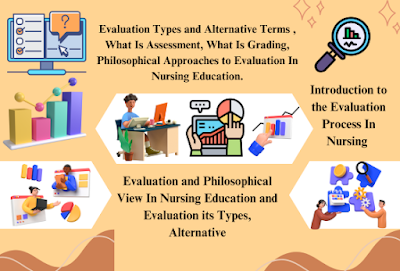The Evaluation its Types Alternative to Evaluation and Philosophical View In Nursing Education. It involves collecting, analyzing, and interpreting information about student performance and development to determine whether educational objectives are being met.
The Evaluation its Types Alternative to Evaluation and Philosophical View In Nursing Education
Assessment in nursing education, which encompasses diverse forms and philosophical approaches, is crucial for evaluating student learning outcomes, program effectiveness, and improving teaching methods. Assessment types can be classified according to function (formative, summative), approach (criterion-referenced, norm-referenced), and interpretation (formative, summative). Alternatives to traditional assessment methods include self-assessment and peer assessment. Philosophical approaches, such as the goal-oriented approach, influence the conduct and interpretation of assessments.
Introduction to the Evaluation Process in Nursing
Evaluation and Philosophical View In Nursing: Nursing faculty are tasked with evaluating not only student learning but also courses, curricula, and program outcomes, alongside their own teaching practices. They are accountable to various stakeholders, including students, peers, administrators, employers, and society, to ensure the nursing program’s effectiveness.
The evaluation process involves determining the worth, quality, and value of student learning and educational programs. This chapter provides an overview of the systematic process of evaluation, using models, selecting instruments, gathering and interpreting data, and reporting findings. These findings can be used to improve various aspects of teaching and learning in nursing education.
What is Evaluation?
Evaluation is the process of determining the value, worth, or quality of a program, activity, or performance. In nursing education, this process starts with setting specific outcomes and criteria, such as program and course outcomes or learning objectives. This is followed by providing opportunities for learning and progress monitoring, culminating in an evaluation or judgment on the extent to which these outcomes were achieved.
Evaluation Types and Alternative Terms
Evaluation in nursing education typically involves gathering data to assess students’ learning in cognitive, psychomotor, and affective domains, as well as evaluating teaching effectiveness and program outcomes. Different types of evaluation are used, depending on the timing and context.
Formative Evaluation
Formative evaluation occurs during the learning process and focuses on ongoing progress towards outcomes. It allows for correction and improvement in real-time and is used in student learning, teaching strategies, or curriculum development.
Advantages:
- Offers real-time feedback.
- Allows for immediate corrections.
- Prevents distortion since events are recent.
Disadvantages:
- May interrupt outcomes.
- Premature judgments can occur before completion of activities.
Summative Evaluation
Evaluation and Philosophical View In Nursing Summative evaluation is conducted at the end of a course, activity, or program, focusing on overall outcomes and accountability. It is often used for final judgments on grades, resource allocation, and program effectiveness.
Advantages:
- Evaluates the entire process after completion.
- Provides conclusive results.
Disadvantages:
- No opportunity to alter the results once completed.
What is Assessment?
Assessment refers to the collection and use of data aimed at improving student learning and teaching effectiveness. Unlike evaluation, assessment is an interactive process between students and faculty, used to provide diagnostic feedback to enhance learning and teaching.
Key Features:
- Focuses on progress and improvement.
- Results are used to guide students toward mastery.
- Not graded, but diagnostic in nature.
What is Grading?
Grading is the process of assigning a quantifiable value to a student’s work, often in the form of a letter grade. Final grades reflect students’ achievements and are required by academic programs to communicate a student’s progress and competence to relevant stakeholders. Grading criteria are usually made clear in the syllabus.
Philosophical Approaches to Evaluation in Nursing Education
The evaluation process in nursing education is influenced by philosophical perspectives that guide how evaluations are conducted, when they are done, and how results are interpreted. Understanding these philosophies can help educators reflect on their beliefs and biases during the evaluation process.
1. Goals Approach
This perspective focuses on the achievement of predefined goals or objectives. Evaluators who use this approach rely on students’ success in meeting these goals to determine the value of a program, course, or activity.
2. Service Orientation
This perspective emphasizes the learning process, encouraging student self-evaluation and reflecting on the teaching-learning interaction. It’s focused on supporting and guiding learners.
3. Judgment Perspective
This approach is centered on determining the worth or merit of a student, faculty member, or program. Evaluators using this perspective focus on making definitive judgments about performance.
4. Research Orientation
A research-oriented approach emphasizes precision in evaluation, using valid and reliable tools and methods to understand why certain outcomes are achieved. It focuses on statistical analysis and rigorous measurement.
5. Constructivist View
In this perspective, the evaluator values stakeholder input and works toward building consensus on what needs to be changed. This view emphasizes collaboration and shared decision-making in the evaluation process.
Conclusion
Evaluation and Philosophical View In Nursing Evaluation in nursing education is a multifaceted process that involves assessing student learning, course effectiveness, faculty performance, and program outcomes. The evaluator’s philosophical perspective plays a significant role in how evaluations are designed and implemented. Whether the focus is on goals, service, judgment, research, or constructivism, nursing educators use evaluations to improve teaching strategies, student outcomes, and the overall quality of nursing education programs.
Read More:
https://nurseseducator.com/didactic-and-dialectic-teaching-rationale-for-team-based-learning/
https://nurseseducator.com/high-fidelity-simulation-use-in-nursing-education/
First NCLEX Exam Center In Pakistan From Lahore (Mall of Lahore) to the Global Nursing
Categories of Journals: W, X, Y and Z Category Journal In Nursing Education
AI in Healthcare Content Creation: A Double-Edged Sword and Scary
Social Links:
https://www.facebook.com/nurseseducator/
https://www.instagram.com/nurseseducator/
https://www.pinterest.com/NursesEducator/
https://www.linkedin.com/in/nurseseducator/
https://www.researchgate.net/profile/Afza-Lal-Din
https://scholar.google.com/citations?hl=en&user=F0XY9vQAAAAJ

This is nicely expressed. .
casino en ligne fiable
Nicely put, Many thanks.
casino en ligne
Valuable advice Appreciate it.
casino en ligne
Cheers, A good amount of information.
meilleur casino en ligne
Fantastic postings Cheers.
casino en ligne fiable
You have made your point.
casino en ligne
This is nicely expressed! .
casino en ligne fiable
Thanks a lot! Terrific information!
casino en ligne
Helpful tips Cheers!
casino en ligne France
Thanks a lot. A lot of knowledge.
meilleur casino en ligne